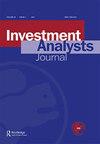银行对国际监管改革的敏感性:以韩国为例
IF 1.2
4区 经济学
Q3 BUSINESS, FINANCE
引用次数: 5
摘要
摘要本研究考察了韩国银行对巴塞尔协议III的顺周期行为的反应,该协议为银行制定了全球资本框架,以及韩国银行在协议通过前对其资本结构的反应的敏感性。采用随机效应面板数据方法,我们发现,协议通过后,银行在资本充足率、盈利能力和破产风险方面的顺周期性得到了缓解。这种变化只在监管改革前资本充足率较低的银行中表现得很明显。我们的研究结果表明,巴塞尔协议III有效地缓解了银行的顺周期性,并且当银行的资本充足率较低时,银行对改革的敏感性会更高。考虑到韩国银行对国际监管改革的不同反应,讨论了新兴经济体和转型经济体采用这种做法的政策含义。本文章由计算机程序翻译,如有差异,请以英文原文为准。
Bank sensitivity to international regulatory reform: The case of Korea
ABSTRACT This study examines the reaction of Korean banks’ procyclical behaviour to the adoption of the Basel III accord, which imposes a global capital framework on banks, and the sensitivity of Korean banks’ reactions depending on their capital structures prior to the adoption of the accord. Employing the random-effects panel data approach, we find that the procyclicality of banks, in terms of the capital adequacy ratio, profitability, and insolvency risk, is mitigated after the adoption of the accord. This change is only evident for banks with low capital adequacy ratios before the regulatory reform. Our findings suggest that the Basel III accord effectively mitigates bank procyclicality and that banks’ sensitivity to the reform becomes greater when their capital adequacy ratios are lower. The policy implications of the adoption in emerging and transitional economies are discussed, given the heterogeneous reaction of Korean banks to the international regulatory reform.
求助全文
通过发布文献求助,成功后即可免费获取论文全文。
去求助
来源期刊

Investment Analysts Journal
BUSINESS, FINANCE-
CiteScore
1.90
自引率
11.10%
发文量
22
期刊介绍:
The Investment Analysts Journal is an international, peer-reviewed journal, publishing high-quality, original research three times a year. The journal publishes significant new research in finance and investments and seeks to establish a balance between theoretical and empirical studies. Papers written in any areas of finance, investment, accounting and economics will be considered for publication. All contributions are welcome but are subject to an objective selection procedure to ensure that published articles answer the criteria of scientific objectivity, importance and replicability. Readability and good writing style are important. No articles which have been published or are under review elsewhere will be considered. All submitted manuscripts are subject to initial appraisal by the Editor, and, if found suitable for further consideration, to peer review by independent, anonymous expert referees. All peer review is double blind and submission is via email. Accepted papers will then pass through originality checking software. The editors reserve the right to make the final decision with respect to publication.
 求助内容:
求助内容: 应助结果提醒方式:
应助结果提醒方式:


